Navigating the world of social skills can be quite the journey, especially for children with autism. It often calls for some creative strategies to help foster those meaningful interactions we all cherish. One approach that’s really gaining traction is role-playing. It’s a fantastic way for kids to practice essential communication skills in a safe and structured environment, making it both engaging and effective.
But what specific strategies can parents and therapists use to really make the most of role-playing? And how can these techniques be tailored to fit the unique needs of each child? Let’s explore this together! By understanding these methods, we can create a supportive space where our kids can thrive.
At Rori Behavioral Innovations, we understand the unique challenges that parents face when it comes to supporting their children with autism. That’s why we’ve developed tailored interactive strategies within our ABA therapy framework to help improve interpersonal development in youngsters. Our clinicians conduct thorough assessments to identify each child’s unique needs, utilizing effective role-playing techniques for social skills in autism that mirror real-life interactions.
This personalized approach not only boosts engagement but also builds confidence in group settings. It gives kids a safe space to practice essential skills. For instance, effective role-playing techniques for social skills in autism might include scenarios like:
Both are crucial for effective communication.
Research shows that children who regularly participate in imaginative activities see significant improvements in behavior and communication. This really highlights how effective our approach can be in ABA therapy! Plus, we often integrate visual aids, like scripts or storyboards, to help young individuals navigate social interactions more easily. These tools improve their understanding of what to expect and how to respond.
Let’s explore this together! We’re here to help you every step of the way!
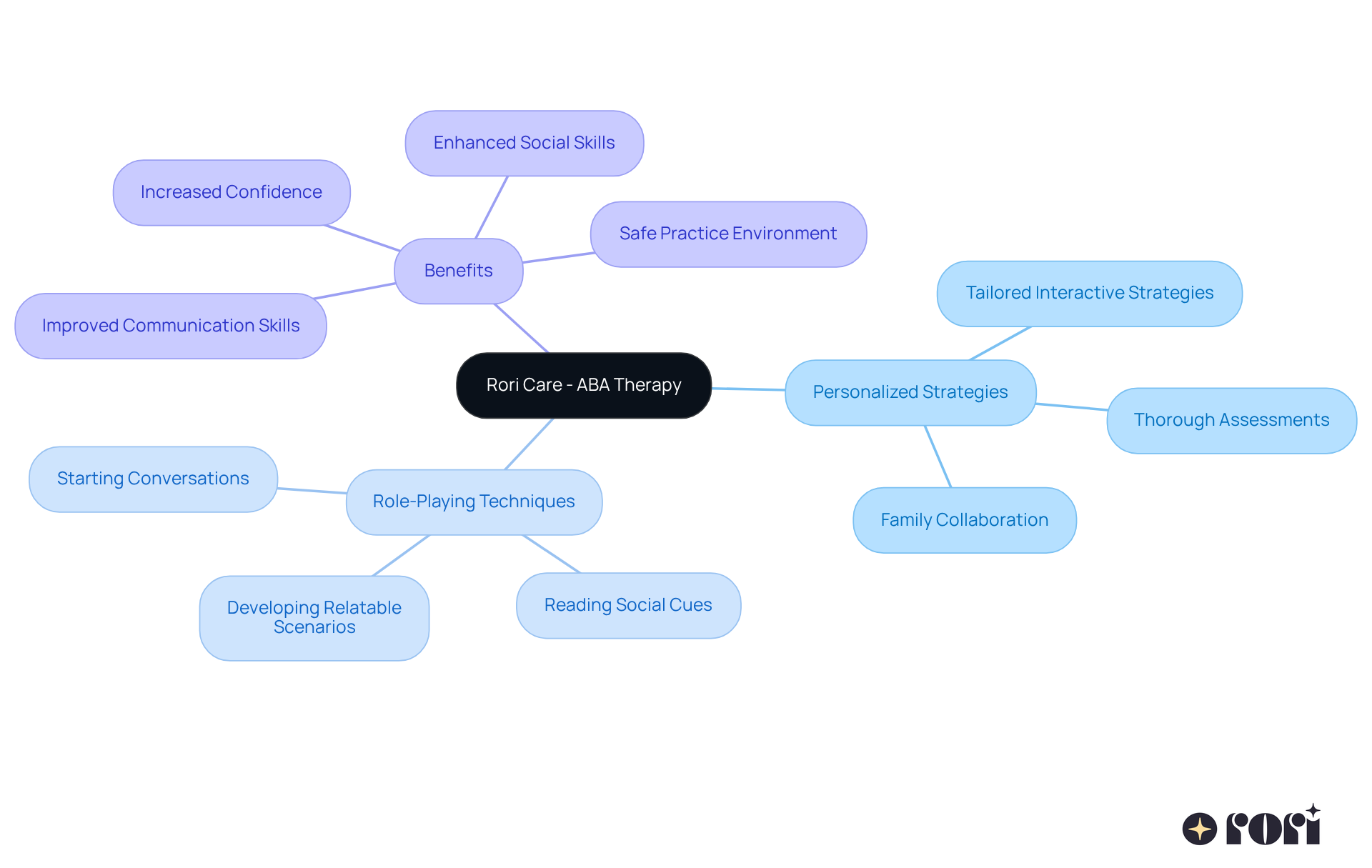
Organized interactive exercises, like 'grocery store interactions' and 'restaurant scenarios,' are examples of effective role-playing techniques for social skills in autism that play a vital role in helping kids develop their communication skills. These fun activities create a safe and playful environment where young individuals can practice effective role-playing techniques for social skills in autism.
Research shows that effective role-playing techniques for social skills in autism not only enhance verbal communication but also assist kids in picking up on non-verbal cues, such as body language and facial expressions, which are vital for social interactions. For instance, kids who regularly engage in dramatic activities see a remarkable 70% improvement in their behavior and communication!
Experts emphasize that effective role-playing techniques for social skills in autism build confidence, enhance skills, and improve problem-solving abilities, ultimately paving the way for meaningful relationships. By tailoring these simulations to each child's unique interests or sensory needs, therapists can make these experiences even more engaging and effective.
Let’s explore this together! By incorporating effective role-playing techniques for social skills in autism, we can support our kids in their journey toward better communication and social skills through interactive exercises.
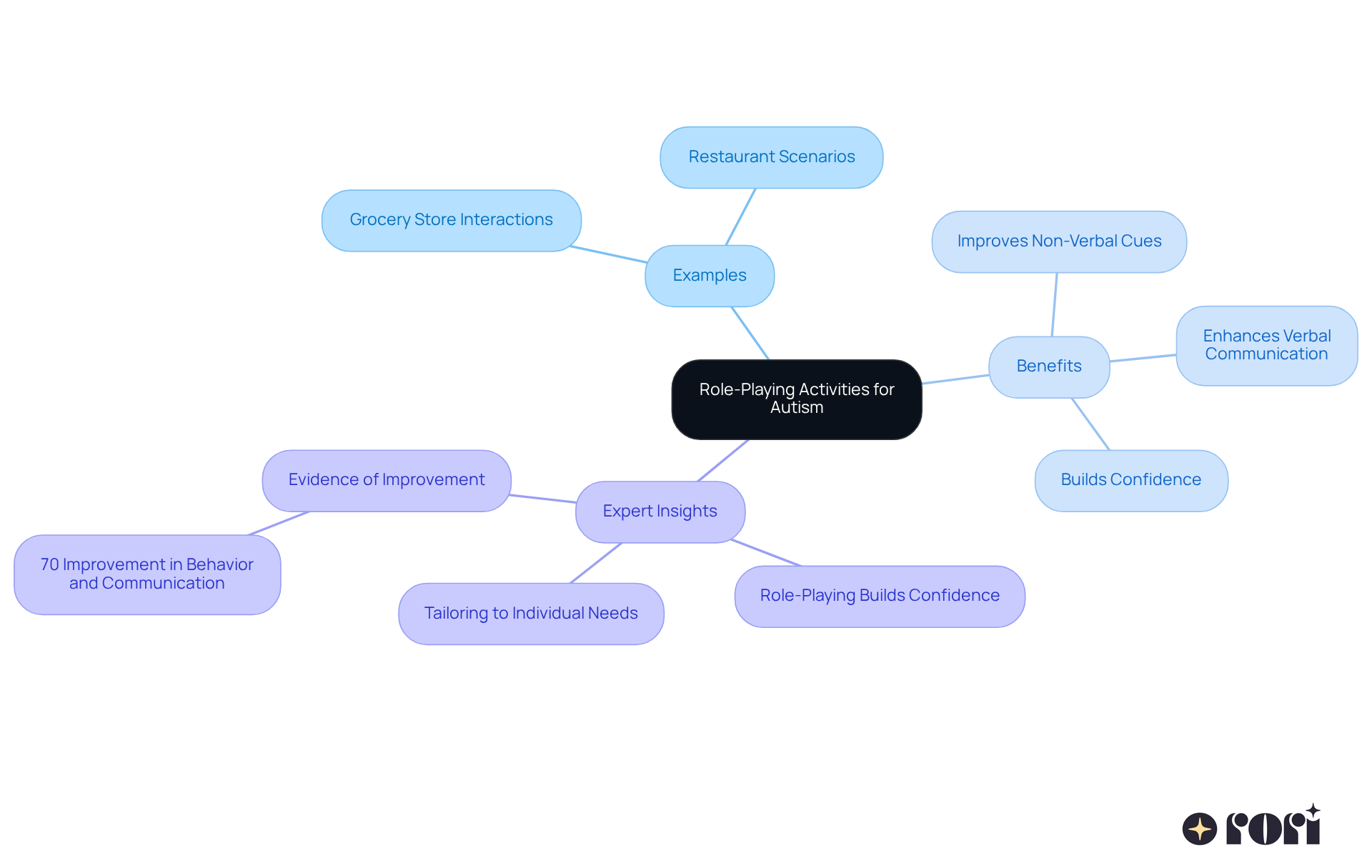
Social interaction groups are a fantastic way for young people to connect with their peers in a supportive environment. By utilizing effective role-playing techniques for social skills in autism, they can simulate real-life situations that are both fun and educational! Think about team sports or group projects - these activities encourage kids to communicate, negotiate, and work together toward shared goals.
Not only does this collaboration boost their interpersonal skills, but it also helps them form friendships, creating a sense of belonging and community. Studies show that kids who engage in these peer interactions often see significant improvements in their social skills, emotional confidence, and ability to navigate complex relationships.
Teachers often highlight how crucial these interactions are for developing essential social skills. They mirror real-life scenarios and inspire kids to learn from one another. Plus, the structured nature of these groups allows youngsters to practice and apply effective role-playing techniques for social skills in autism, which leads to lasting benefits in their social development.
And let’s not forget about the role of caregivers! Training for parents is key in supporting these initiatives, giving them the tools they need to reinforce social skills at home. So, let’s explore this together and see how we can help our kids thrive!
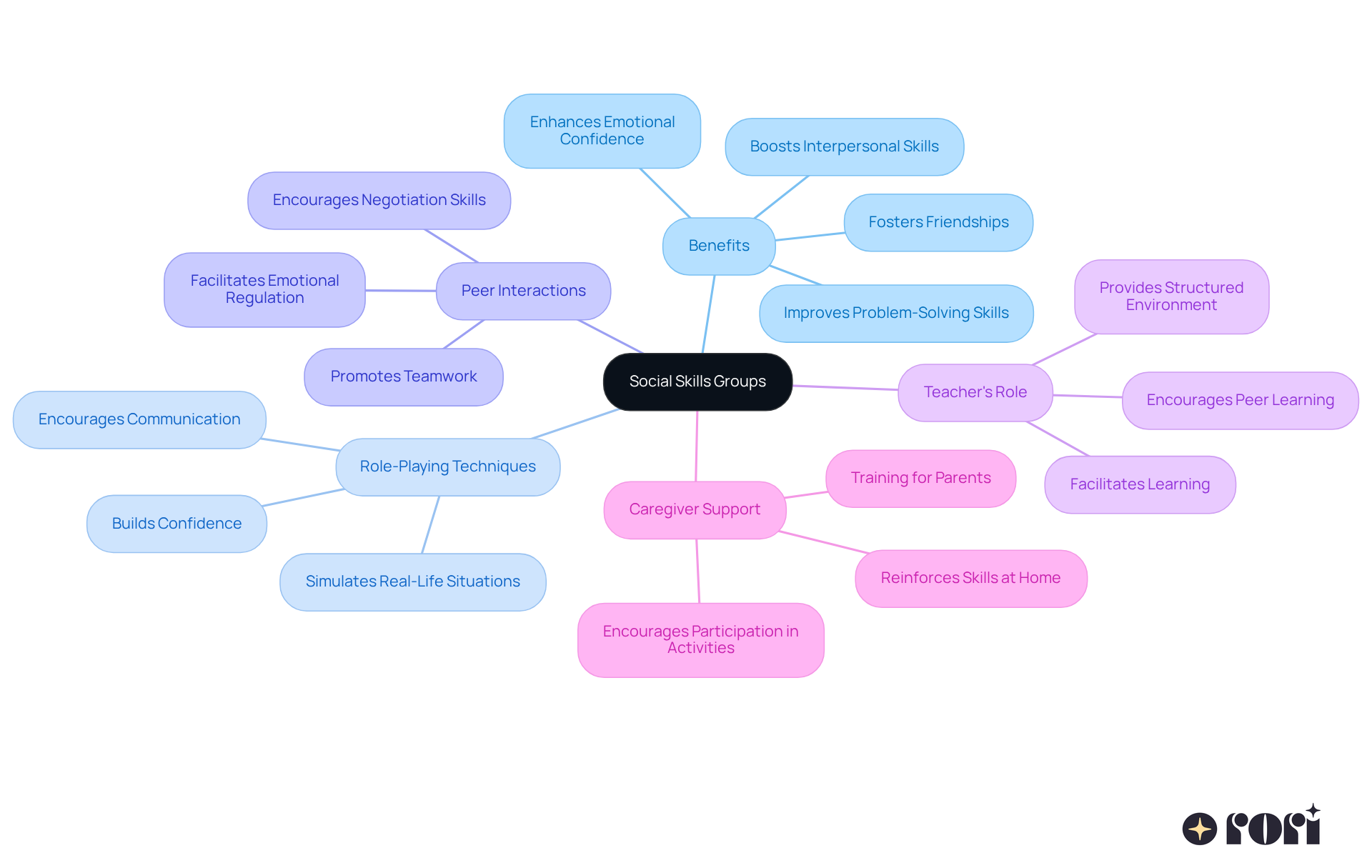
Integrating visual aids into effective role-playing techniques for social skills in autism can significantly help kids grasp and remember important interpersonal skills. Think about tools like picture cards, stories, and visual schedules - they serve as handy references, guiding children through those tricky social interactions. For example, a visual aid that shows the steps of a conversation can make it feel less overwhelming and much more doable.
Research shows that using visual aids can boost conversation engagement levels from a baseline of 2-20% to 6-28% during interventions. That’s pretty impressive! Not only do these aids help with understanding, but they also build confidence as kids dive into role-plays. Plus, group therapy focused on interpersonal skills, led by trained therapists, can really enhance how individuals communicate and connect with each other in a group setting.
Stories about social situations and emotion graphs have been shown to improve emotional understanding and interactions with peers. By using these visual aids, kids with autism can better anticipate social cues and expectations, which ultimately enhances their interaction skills. And guess what? Caregivers can play a big role in this journey too! By participating in effective role-playing techniques for social skills in autism at home and using similar visual aids, they can reinforce the skills learned in therapy.
Let’s explore this together! Your involvement can make a world of difference!

Role-playing games (RPGs) are a fantastic way for kids to boost their social skills while having a blast! Games like Dungeons & Dragons invite players to step into different roles, tackle social challenges, and team up with friends to achieve shared goals. This immersive experience not only sparks creativity but also helps young people build essential skills like empathy, problem-solving, and communication in a supportive environment.
Research shows that effective role-playing techniques for social skills in autism can significantly improve social interactions and emotional understanding, making them a powerful tool for enhancing relational skills among kids with autism. For instance, studies have found that participants in RPG-based programs reported more verbal interactions and better social skills, demonstrating the effectiveness of effective role-playing techniques for social skills in autism in real-life situations.
Plus, the teamwork aspect of RPGs encourages kids to develop critical thinking and negotiation skills, which are crucial for navigating complex social scenarios. By simulating real-life situations, RPGs help kids gain confidence and resilience, preparing them for meaningful community involvement throughout their lives.
And let’s not forget about group therapy focused on social development! Guided by trained therapists, these sessions provide structured opportunities for kids to interact and build relationships with their peers, further enhancing their skills. Caregiver education plays a vital role too, equipping parents with the tools and strategies they need to support their children’s growth effectively.
So, let’s explore this together! We’re here to help you every step of the way!
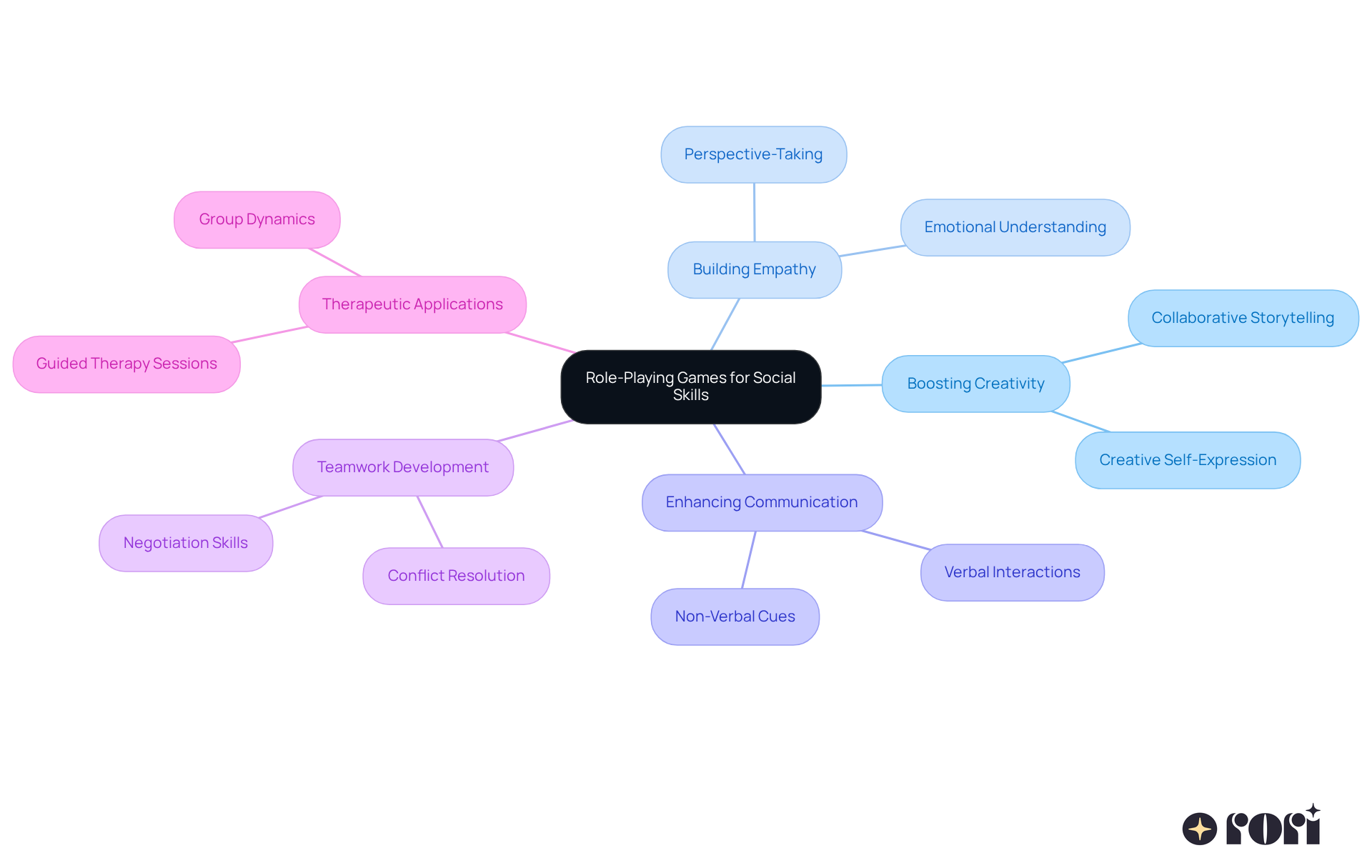
Incorporating technology into interactive practices opens up exciting possibilities for improving interpersonal training in youth with autism! 🌟 Think about it: various apps and web platforms create interactive situations where young individuals can engage through effective role-playing techniques for social skills in autism.
For example, programs that mimic real-life scenarios use effective role-playing techniques for social skills in autism, allowing kids to participate in virtual acting and helping them learn how to manage interactions and reactions in a safe space.
This tech-driven approach not only boosts engagement but also offers personalized feedback and progress tracking. It’s all about making sure each child’s unique learning needs are met effectively.
So, let’s explore this together and see how these tools can make a difference in your child’s journey!
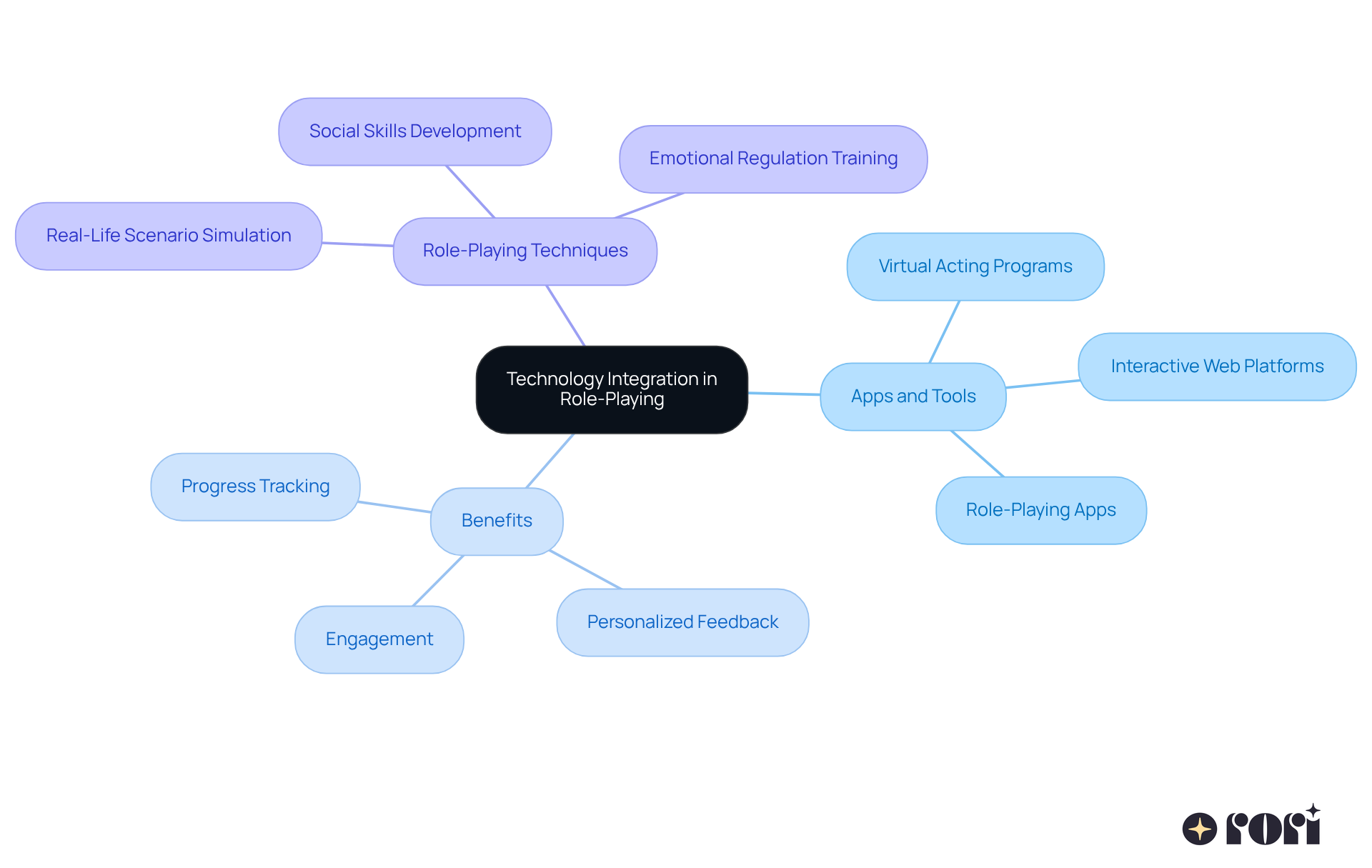
Parent-led role-playing activities are a fantastic way to strengthen the interpersonal skills that kids learn in therapy by utilizing effective role-playing techniques for social skills in autism. When parents utilize effective role-playing techniques for social skills in autism at home, they create a nurturing environment where children feel comfortable practicing their skills. Simple activities like 'pretend play' scenarios or 'family role-plays' serve as effective role-playing techniques for social skills in autism, enabling parents to model appropriate behaviors and provide immediate feedback.
Did you know that studies show regular participation in role-play can boost social interaction skills by up to 40%? That’s pretty impressive! It really highlights how effective role-playing techniques for social skills in autism can be in fostering communication and behavioral improvements in about 70% of young people. This collaborative practice not only strengthens the bond between parents and kids but also empowers parents to take an active role in their children's development, building resilience and confidence along the way.
Through caregiver education, parents gain valuable support and decision-making skills, enhancing their ability to help their children achieve their behavioral goals. By incorporating effective role-playing techniques for social skills in autism into everyday activities, parents can reinforce interpersonal skills, creating an engaging learning experience that mirrors real-life interactions. Let’s explore this together and see how you can make a difference in your child’s life!

Narratives are such powerful tools for helping kids get ready for role-playing situations! They clearly outline what’s expected and how to react appropriately. By sharing stories that reflect real-life community scenarios, parents and therapists can help young ones visualize and grasp what to expect. For instance, think about a story about going to a birthday party - it can show kids important behaviors like saying hello, sharing toys, and saying thank you.
This kind of preparation not only eases anxiety but also boosts kids' confidence as they dive into role-playing activities. Isn’t that great? Studies have shown that kids who engage with narrative tales make significant strides in their interactions with others. This really highlights how effective role-playing techniques for social skills in autism can be in improving social skills.
Teachers also point out that using effective role-playing techniques for social skills in autism helps kids become more emotionally aware, making it easier for them to navigate social situations. By embracing these structured narratives, families can empower their children to engage more meaningfully with others, supporting their overall growth. Let’s explore this together!
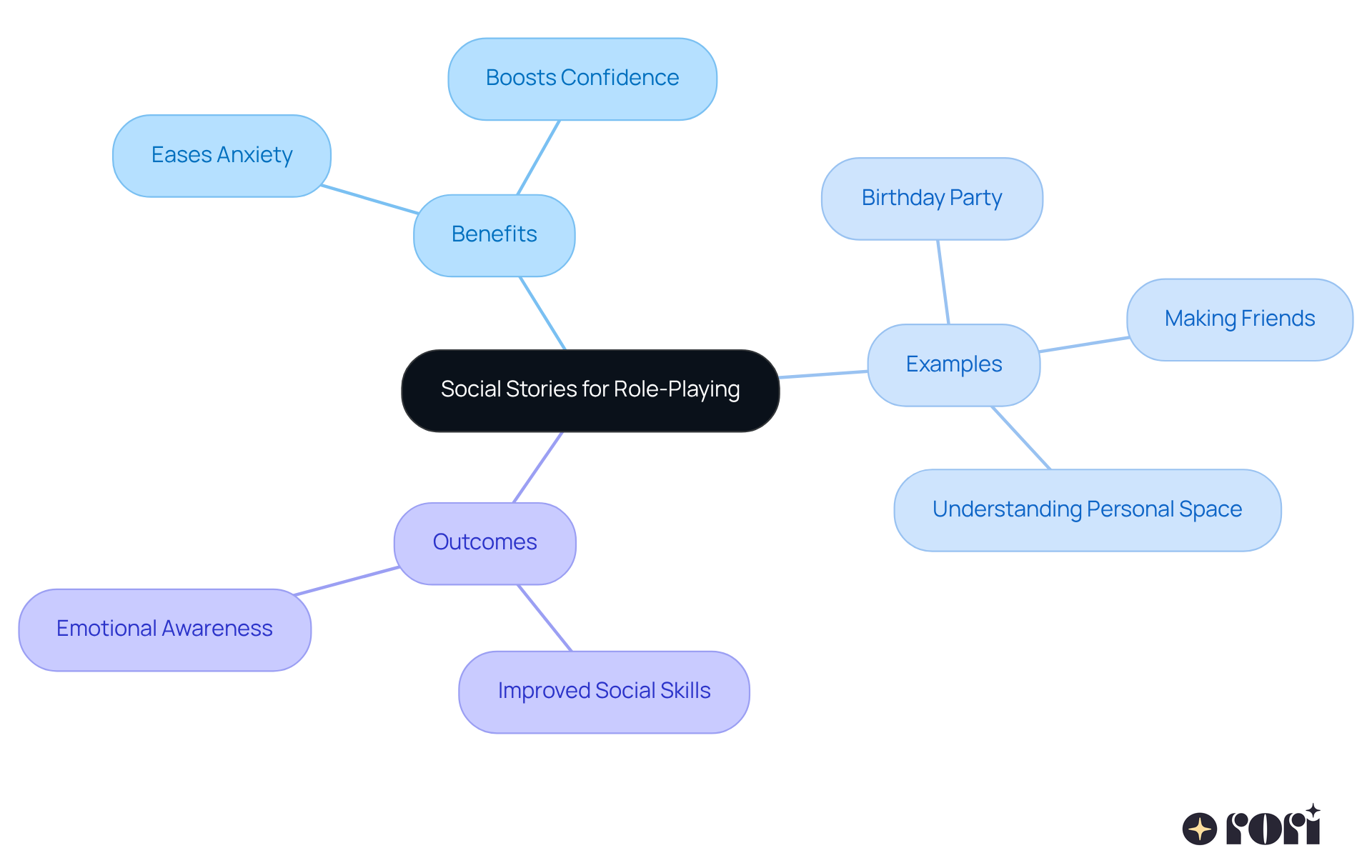
Peer modeling is a fantastic way to teach interpersonal skills by using effective role-playing techniques for social skills in autism to act out real-life scenarios. When young people watch their peers interact, they pick up on the right behaviors and reactions in the moment. For example, if a child sees a friend successfully start a conversation or share a toy, they’re more likely to try that out themselves during their own role-playing. This kind of observational learning not only builds a sense of community but also encourages kids to practice their interpersonal skills naturally, which is so important for their overall growth.
Research shows that these interactions can boost motivation and competence. In fact, studies indicate that peer-mediated interventions can lead to an impressive average effect size of 1.3 in improving performance among youth with autism. Plus, when effective role-playing techniques for social skills in autism are utilized in group therapy sessions at places like Rori Care, kids can develop essential skills like starting conversations and responding appropriately-skills that are crucial for effective communication and building relationships.
As Ingersoll points out, low-intensity, targeted imitation interventions can really help with persistent interaction challenges in ASD. By creating supportive environments where kids can observe and engage with their peers, we can unlock their potential for meaningful social interactions. And let’s not forget about the role of caregiver education! It’s vital for supporting youth development through ABA, giving families the tools they need to nurture their children’s growth and improve behavioral outcomes.
To further enhance these skills, caregivers can get involved by practicing scenarios at home, reinforcing what kids learn in therapy. Let’s explore this together and see how we can make a difference!
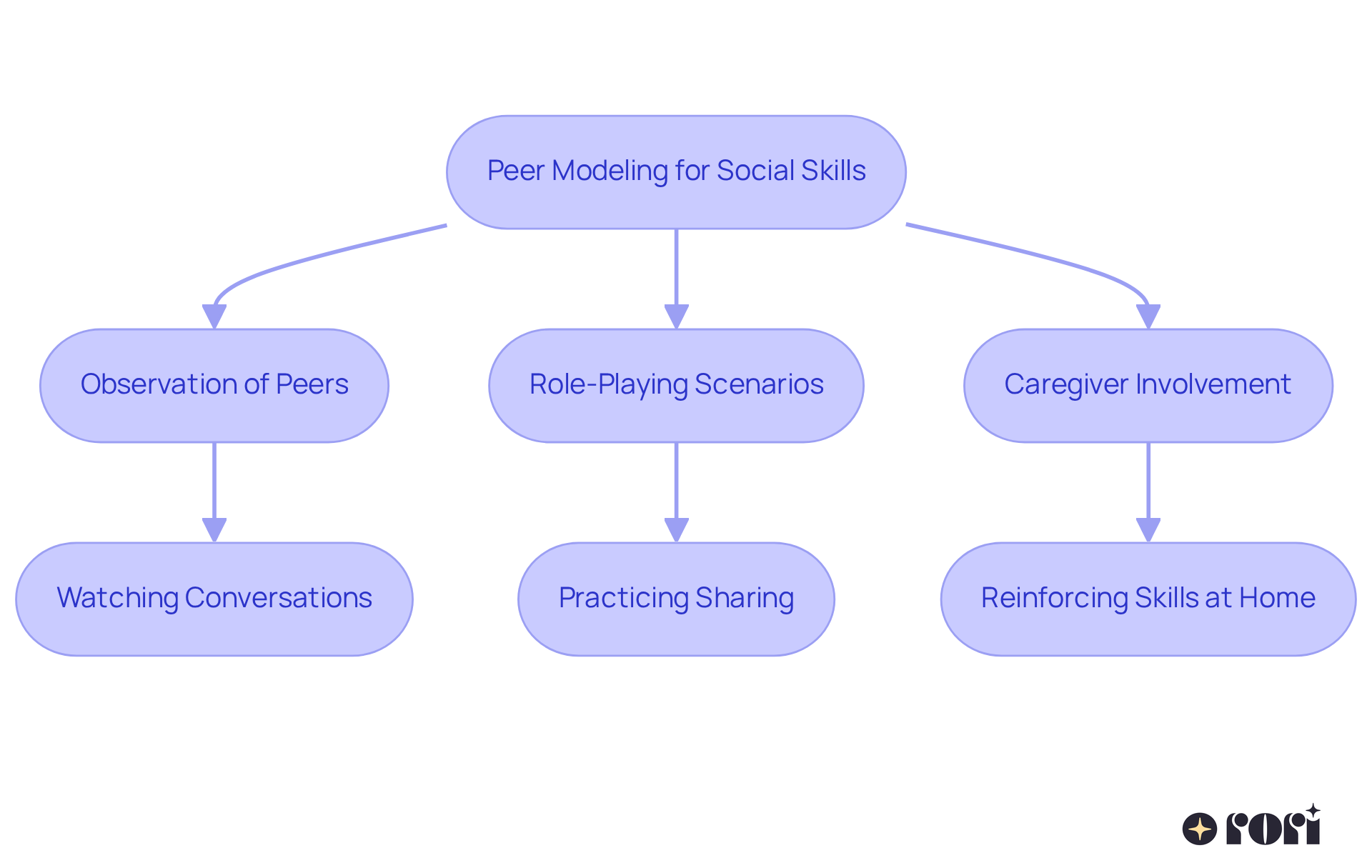
Incorporating feedback into effective role-playing techniques for social skills in autism is crucial for enhancing our young learners' experiences! 🌟 When kids receive helpful feedback, they can really grasp their strengths and see where they can grow in their interactions with others. After each role-play, facilitators can share specific feedback, pointing out what went well and suggesting areas for improvement. For example, if a child excels at maintaining eye contact, we can praise that while gently encouraging them to practice starting conversations more often. This kind of feedback loop not only reinforces positive behaviors but also motivates kids to keep sharpening their interpersonal skills by utilizing effective role-playing techniques for social skills in autism.
And let’s not forget about the caregivers! Equipping them with ABA principles and strategies can really boost their ability to support their children's behavioral goals. By actively joining in these role-playing exercises and understanding the feedback process, caregivers can make informed choices that positively influence their child's progress. This leads to better behavioral outcomes and helps kids feel more confident in social situations. So, let’s explore this together and see how we can make a difference!
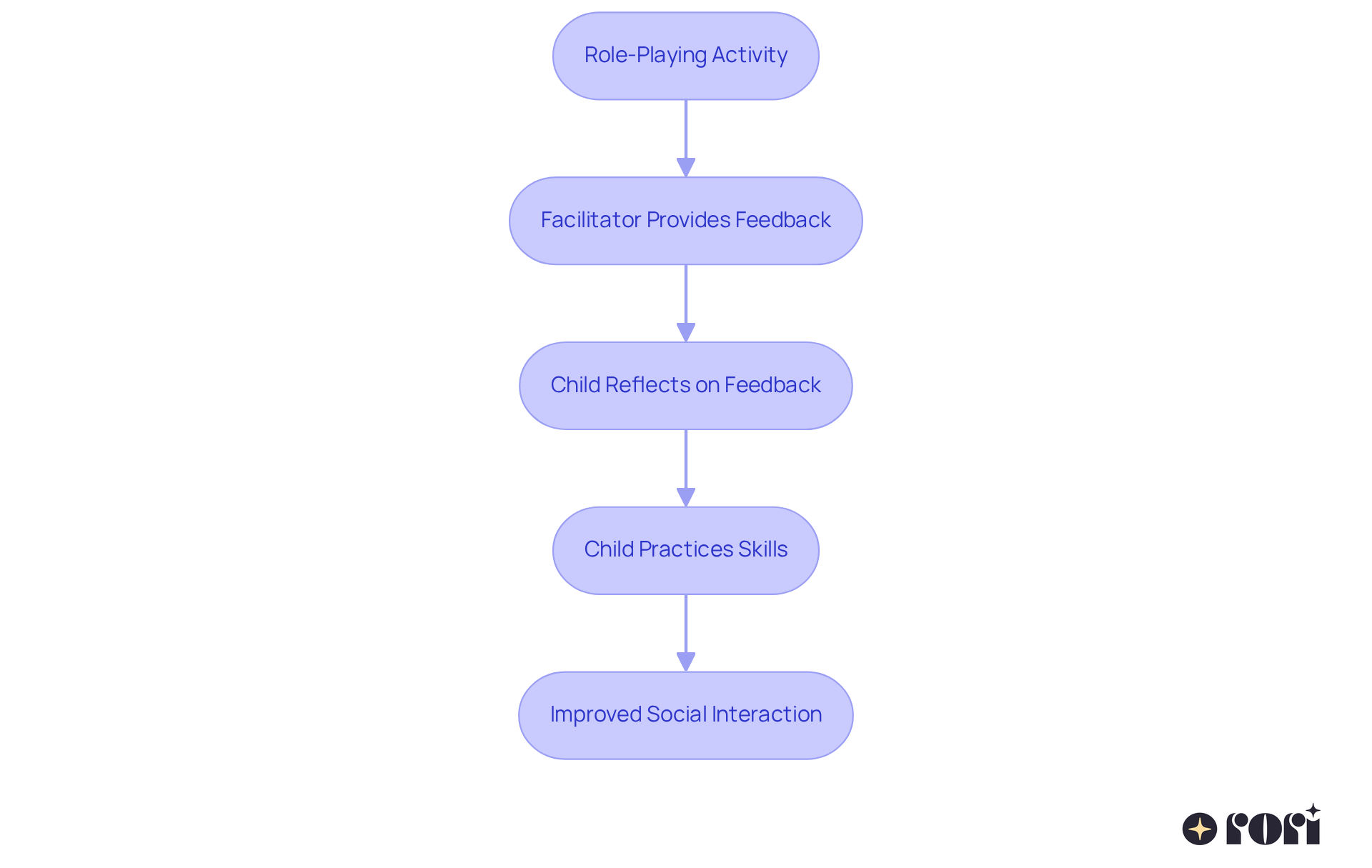
When it comes to helping children with autism develop social skills, effective role-playing techniques can be a game changer! These methods create engaging, personalized scenarios that allow kids to practice essential social skills in a safe and supportive environment. This not only builds their confidence but also enhances their ability to navigate real-world interactions.
Throughout this article, we've explored various strategies, from structured role-playing games to collaborative group activities, and even the use of visual aids and technology. Each of these methods brings unique benefits, like improving verbal and non-verbal communication, enhancing emotional understanding, and providing opportunities for peer modeling and feedback. Together, these approaches form a comprehensive framework that empowers children with autism to thrive socially.
But the impact of these role-playing techniques goes beyond just therapy sessions. They encourage active participation from caregivers and families, which is so important! By reinforcing these skills at home and in everyday life, parents can play a crucial role in their child's development. Engaging in these activities together not only strengthens family bonds but also equips children with the tools they need to build meaningful relationships and navigate social situations more effectively.
Embracing these strategies can truly make a profound difference in the lives of children with autism. It paves the way for a brighter future filled with social connections and opportunities. So, let’s explore this together! Remember, we’re here to help you every step of the way!
What is Rori Care's approach to ABA therapy for children with autism?
Rori Care utilizes tailored interactive strategies within their ABA therapy framework, focusing on personalized role-playing techniques to improve interpersonal development in children with autism.
How do role-playing techniques help children with autism?
Role-playing techniques help children practice essential social skills, such as starting conversations and reading social cues, in a safe and engaging environment, which boosts their confidence and communication abilities.
What types of scenarios are used in role-playing for social skills development?
Scenarios may include everyday interactions like starting conversations and grocery store interactions, which mirror real-life situations to enhance communication skills.
What evidence supports the effectiveness of role-playing techniques in improving social skills?
Research indicates that children who regularly participate in imaginative activities see significant improvements in behavior and communication, with some reports showing up to a 70% improvement.
How do visual aids contribute to social skills development in children with autism?
Visual aids, such as scripts or storyboards, help children understand social interactions better by providing clear expectations and responses, enhancing their ability to navigate social situations.
What role do social interaction groups play in developing social skills?
Social interaction groups allow children to engage in collaborative activities that simulate real-life situations, helping them improve their interpersonal skills, form friendships, and build a sense of community.
How do caregivers support the social skills development of children with autism?
Caregiver training is essential as it equips parents with the tools to reinforce social skills at home, complementing the efforts made in therapy and group settings.